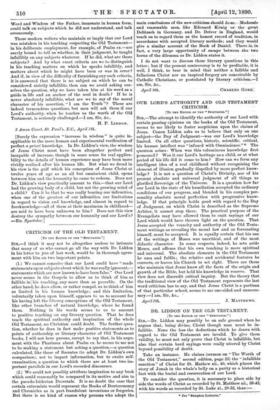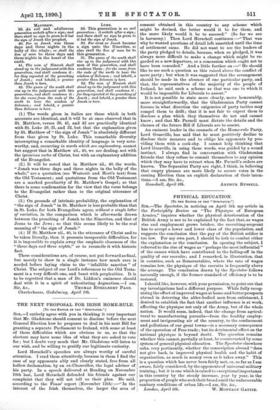DR. LIDDON QN THE OLD TESTAMENT.
[To THE EDITOR OF THE "SPECTATOR."] SIR,—Dr. Liddon may possibly be on safe ground when he argues that, being divine, Christ though man must be in- fallible. None the less the deductions which he draws with regard to the Old Testament are invalid. To give them validity, he must not only prove that Christ is infallible, but also that certain hard sayings were really uttered lg Christ beyond possibility of doubt.
Take an instance. He claims (sermon on "The Worth of the Old Testament," second edition, page 23) the " infallible sanction" of Christ for St. Mathew xii., 40, which places the story of Jonah in the whale's belly on a parity as a historical fact with the burial and resurrection of our Lord.
To consider the question, it is necessary to place side by side the words of Christ as recorded by St. Matthew xii., 39-42, with his words as recorded by St. Luke xi., 29-32, thus :—
• Ecte " Bampton Lectures." (1.) The words given in italics are those which in both accounts are identical, and it will be at once observed that in St. Matthew, verses 39, 41, and 42 are practically identical with St. Luke 29, 31, and 32, but that the explanation given by St. Matthew of "the sign of Jonah" is absolutely different from that given by St. Luke. This remarkable diversity interrupting a remarkable identity of language is very note- worthy, and, occurring in words which are explanatory, cannot but suggest that in Matthew xii., 40, we are dealing, not with the ipsissinia verba of Christ, but with an explanatory addition of the Evangelist.
(2.) It will be noted that in Matthew xii., 40, the words, "Jonah was three days and three nights in the belly of the whale," are a quotation (see Westcott and Hort's text) from the Old Testament; and quotations from the Old Testament are a marked peculiarity of St. Matthew's Gospel; so that there is some confirmation for the view that the verse belongs to the Evangelist rather than to the original utterance of Christ.
(3.) On grounds of intrinsic probability, the explanation of "the sign of Jonah" in St. Matthew is less probable than that in St. Luke, for both Evangelists agree, without a single letter of variation, in the comparison which is afterwards drawn between the preaching of Jonah to the Ninevites, and that of Jesus to the Jews ; so that this seems likely to be the real meaning of "the sign of Jonah."
(4.) If St. Matthew xii., 40, is the utterance of Christ and to be taken literally, then it presents insuperable difficulties, for it is impossible to explain away the emphatic clearness of the "three days and three nights," or to reconcile it with historic fact.
These considerations are, of course, not put forward as final, but merely to show in a single instance how much care is needed before laying claim to the "infallible sanction" of Christ. The subject of our Lord's references to the Old Testa. meat is a very difficult one, and beset with perplexities. It is to be regretted that a man of Dr. Liddon's eminence should deal with it in a spirit of unhesitating dogmatism.—I am, llf_errnzw.
39. An evil and adulterous generation seeketh after a sign; and there shall no sign be given to it but the sign of Jonah the prophet. 40. For as Jonah was three days and three nights in the belly of the whale ; so shall the Son of man be three days and three nights in the heart of the earth.
41. The Men of Nineveh shall stand up in the judgement with this generation, and shall condemn it : for they repented at the preaching of Jonah; and behold, a greater than Jonah is here.
42. The queenof the south shall rise up in the judgement with this generation, and shall condemn it : for she came from the ends of the earth to hear the wisdom of Solomon; and behold, a greater Than Solomon is here.
Luna.
29. This generation is an evil generation : it seeketh after a sign; and there shall no sign be given to it but the sign of Jonah.
30. For even as Jonah became a sign unto the Ninevites, so also shall the Son of man be to this generation.
31. The queen of the south shall rise up in the judgement with the men of this generation, and shall condemn them : for she came from the ends of the earth to hear the wisdom of Solomon; and behold, a greater than Solomon is here.
32. The men of Nineveh shall stand up in the judgement with this generation and shall condemn it : for they repented at the preaching of Jonah ; and behold, a greater than Jonah is here.



































 Previous page
Previous page